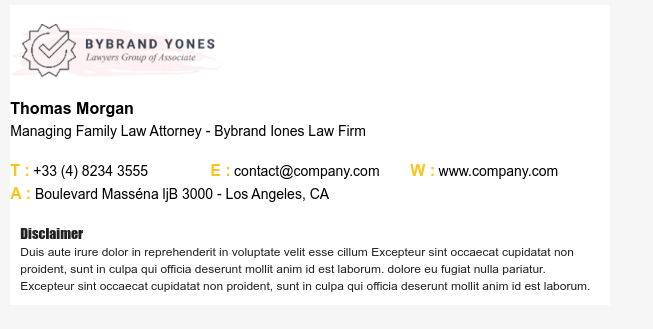This post is also available in: Português
When you open an email message from someone, you may notice that there is sometimes a warning at the end. It can be something generic like:
“Think Before Printing”
Or a sentence that starts this way:
“This message is confidential and is intended only for…” .
But in individual messages, especially from companies, the text changes to long texts with an exemption from liability. I, and perhaps you, most of the time, ignore them unconsciously.
The fact is, according to some law, we cannot open a mail correspondence that is not addressed to you without authorization. Similarly, you should not read an email if the message does not have you as a destination, and can produce an opposite result than expected. Dealing with the issue of disclaimers today, does your business need them?
Legal notice use cases in emails
Most companies use legal notice in the email because they have seen others doing it somewhere. It probably started with a company that wanted to stand out (marketing), so in the long run, it became a role model for other companies, picking on the suggestion, and doing that too. For those who have been using the internet since the early days, they certainly know that the trend has been around for some time.
Even with the advancement of technology and legal knowledge, new and old companies do not appear to diminish the use of these exemptions. While many would argue that they are using exceptions to protect themselves in legal battles, let’s look at some of how a legal disclaimer can be useful.
1. Protection of confidentiality
Sometimes confidential information can be sent by email, and anyone can have access to those emails at the other end. In other cases, these emails may have been sent to the wrong address. With a disclaimer, this organization can protect the information from being leaked when viewed by another individual than the intended recipient.
2. Company responsibility
An employer is hugely responsible for the actions of its employees. If the organization states in the notice that it has given clear instructions to employees not to send harmful content via the email platform, the organization would be further distanced from the actions of the sender if a problem arises. In this way, they are better protected against litigation.
3. Wrong statements
Let’s say, for example, that an organization sends an email that advises on the stock market, and such information ends up causing people to lose money; the organization is undoubtedly at risk for prosecution. That is if they do not have a legal notice in place.
In the event a disclaimer is present, they could get rid of the web of law if such legal notice had expressly stated something that made the reader responsible for the actions they took based on that information.
Does your company need a legal notice?
With the number of points mentioned above, you may have started thinking, “Yes! A legal notice in the email is exactly what I need to protect my business. “I have three words for you:” You’re wrong. “
To enter into a legally binding agreement, you must state the terms and conditions and then obtain all parties’ consent. Legal notice by email does try to force an agreement’s delivery open by the reader’s throat. You may indeed have done a superficial thing by trying to keep your business safe, but you never made the reader agree with it.
On the other hand, while email waivers may protect you, they are just for extending your precise wording of such exemptions. I would like you to know that in the US – the place where most litigation occurs – there has never been a case that has been influenced because an email notice was present.
Going in more developed societies such as Europe, the European Commission supports that all contractual agreements that do not give way to free consumer negotiation are not worth much. In the end, everything he wrote had no force in front of the courts.
Maybe it would be best for your business if you remove those long annoying phrases in your email signature. Although not less protected by law, you would also keep your customers happier.
Read too:
- How law firms can benefit from professional email signatures;
- 8 Effective examples of email signature disclaimers;
Legal Advice, Legal Advice, Disclaimer, can be found in many ways. Notably, specific businesses like banks, multinationals, law firms, and large corporations tend to use more disclaimers.
How to add a legal notice of email signature
In the Bybrand editor, adding a legal warning area in your email signature is quick. See the video below. Next, you need to complement the custom text.
To finish
Trying not to be ironic, here is my disclaimer: I am not a lawyer, and the following information above should not be taken as legal advice. I organized and researched information from various sources on the internet.
This article was last updated on June 6, 2019

Create your first email signature with Bybrand
Bybrand offers the ability to generate, administer, and distribute essential email signatures for your employees.

Comments are closed.